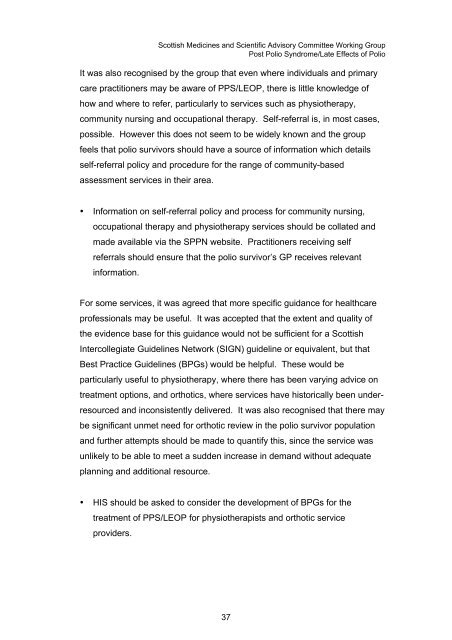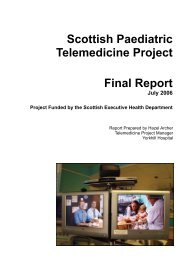SMASAC Working Group Post Polio Syndrome - Scottish Health On ...
SMASAC Working Group Post Polio Syndrome - Scottish Health On ...
SMASAC Working Group Post Polio Syndrome - Scottish Health On ...
Create successful ePaper yourself
Turn your PDF publications into a flip-book with our unique Google optimized e-Paper software.
<strong>Scottish</strong> Medicines and Scientific Advisory Committee <strong>Working</strong> <strong>Group</strong><br />
<strong>Post</strong> <strong>Polio</strong> <strong>Syndrome</strong>/Late Effects of <strong>Polio</strong><br />
It was also recognised by the group that even where individuals and primary<br />
care practitioners may be aware of PPS/LEOP, there is little knowledge of<br />
how and where to refer, particularly to services such as physiotherapy,<br />
community nursing and occupational therapy. Self-referral is, in most cases,<br />
possible. However this does not seem to be widely known and the group<br />
feels that polio survivors should have a source of information which details<br />
self-referral policy and procedure for the range of community-based<br />
assessment services in their area.<br />
• Information on self-referral policy and process for community nursing,<br />
occupational therapy and physiotherapy services should be collated and<br />
made available via the SPPN website. Practitioners receiving self<br />
referrals should ensure that the polio survivor’s GP receives relevant<br />
information.<br />
For some services, it was agreed that more specific guidance for healthcare<br />
professionals may be useful. It was accepted that the extent and quality of<br />
the evidence base for this guidance would not be sufficient for a <strong>Scottish</strong><br />
Intercollegiate Guidelines Network (SIGN) guideline or equivalent, but that<br />
Best Practice Guidelines (BPGs) would be helpful. These would be<br />
particularly useful to physiotherapy, where there has been varying advice on<br />
treatment options, and orthotics, where services have historically been underresourced<br />
and inconsistently delivered. It was also recognised that there may<br />
be significant unmet need for orthotic review in the polio survivor population<br />
and further attempts should be made to quantify this, since the service was<br />
unlikely to be able to meet a sudden increase in demand without adequate<br />
planning and additional resource.<br />
• HIS should be asked to consider the development of BPGs for the<br />
treatment of PPS/LEOP for physiotherapists and orthotic service<br />
providers.<br />
37



